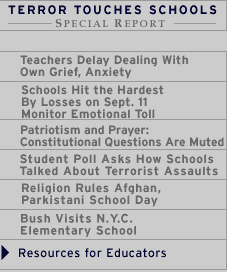A number of organizations offer information and guidance for educators and parents about how to help students cope in the aftermath of the attacks on the World Trade Center and the Pentagon. Here is a sampling of what’s available on the Web:

|
Mental Health Organizations
The American Academy of Child and Adolescent Psychiatry has compiled several discussion papers, including:
- “Helping Children After a Disaster”;
- “Children and the News”; and
- “How to Talk to Children and Parents After a Disaster.”
The National Association of School Psychologists has compiled a list of articles, books, handouts, and other resources to help educators “help children begin the healing process resulting from this senseless act of violence,” including:
- “Helping Children Cope With Tuesday’s Acts of Terrorism”;
- “Children and Responding to National Disaster”; and
- “Disaster: Helping Children Cope”;
- “Helping Children Handle Disaster-Related Anxiety”;
- “Crisis Follow-up Activities”; and
- “Cultural Perspectives on Trauma and Critical Response.”
The National Mental Health Association posts this reaction statement to the Sept. 11, 2001, attacks. Includes “Helping Children Handle Disaster-Related Anxiety.”
Organizations for Children & Parents
KidsHealth, a Web site created by the Nemours Foundation’s Center for Children’s Health Media to provide health information for children, has several articles for teachers, young children, and teenagers, including:
- “For Teachers: Talking About the Terrorist Attacks”;
- “Dealing With the Terrorist Attacks”; and
- “How to Help After the Terrorist Attacks”; and
- “Helping Your Child Deal With a Terrorist Tragedy.”
KidsHealth advises parents to maintain normal family routines even in the face of tragedy. “Anxiety is ‘contagious,’” says KidsHealth. “It will be helpful for your child to see that your world, and theirs, are not in chaos.”
Sesame Street Parents has posted several articles, including tips on “Tragic Times, Healing Words.” Other resources include “Children and Media” and “Stress and Fears.”
Fred Rogers offers some tips on how to help children deal with events they see on the news that are scary and hard to understand.
TimeforKids lists resources for teachers, including:
- “Coping With Stress”;
- “Talking With Kids”—"The best overall strategy is to do two things simultaneously: acknowledge their fear while simultaneously reassuring them. ..."; and
- “Teacher Resources”, where teacher readers write in with their suggestions and coping strategies.
“Coping With Death and Grief,” a collection of resources for parents, teachers and community members from Connect for Kids. Among other resources on offer are “Strategies for Parents and Teachers,” and “Zero to Three: How to Discuss Terrorism with Young Children.”
Talking With Kids About Tough Issues, a national campaign from Children Now and the Kaiser Family Foundation, encourages parents to talk to kids about the news, and specifically about the media and disasters.
Education Associations
The National Education Association offers a wide range of resources in its Crisis Communications Guide and Toolkit, including:
- “Support Long-Term Healing”;
- “Frequently Asked Questions”; and
- “The First Day Back at School Following a Crisis.”
General Resources
The ERIC database has a comprehensive page of resources for teaching students about terrorism.
“Some Therapists Caution That Trauma Services Could Backfire,”The New York Times, Sept. 16, 2001.
“Any time that a child is motivated enough to ask a question, it is an opportunity for us to take advantage of a teachable moment,” says James Madison University’s Dr. Lennis G. Echterling in “How to Talk to Children About the Threat of Biological Warfare or Terrorist Attack,” posted by the Federal Emergency Management Agency. Also from FEMA, How to Help Children After a Disaster: A Guidebook for Teachers (requires Adobe’s Acrobat Reader).
“Coping With Trauma,” from AboutOurKids.org, reprinted from the November 1999 issue of Child Magazine.
“A Practical Guide for Crisis Response in Our Schools, Fourth Edition,” from The American Academy of Experts in Traumatic Stress, establishes guidelines for parents and teachers for crisis response. Included in the edition are “Responding to a Crisis Situation,” “Age-Appropriate Reactions and Intervention Strategies,” and “Practical Information Concerning Grief Counseling.” (Requires Adobe’s Acrobat Reader).
“To Be Involved or Not: Crisis Intervention in Schools,” from Westwind Publications, Feb. 11, 1999. The author suggests that “crisis intervention and follow-up in the schools can be the first line of defense for addressing some of the most distressing and problematic issues that currently face our young people.”
“School Crisis Response: Expecting the Unexpected,”Educational Leadership, November 1994, suggests that a coordinated districtwide crisis response requires careful planning.
Crisis Intervention Resource Manual, from the Bartow County (Ga.) School System, provides quick summaries on a “Child’s View of Death,”“Key Factors Which Influence a Child’s Response to Death,” and “Helping Kids Cope With Grief.” Also provided is a list of links to materials on “Disasters and Coping.”
David Baldwin, a psychologist in private practice, maintains a Web site on trauma, with an extensive list of links to trauma-related sites.
“Talking to Children About Violence and Other Sensitive and Complex Issues in the World,” adapted by Linda Lantieri from A Discussion Guide for Parents and Educators by Susan Jones and Sheldon Berman. This guide explores some of the questions that parents and teachers frequently ask about ways to discuss such tragedies as the recent attacks.
“Talking to Your Kids About Terrorism,” from MSNBC, Sept. 13, interviews child psychology experts for their advice.
Curriculum Resources
National Geographic.com documents life under the Taliban in this photo essay. The site also offers suggested activities designed to help students understand the tragedy. The Perfect Storm author Sebastian Junger profiled the anti-Taliban leader Ahmad Shah Massoud in the March/April 2001 issue of Adventure magazine. This photo essay goes behind-the-scenes with Junger.
The New York Times’ Learning Network offers a list of conversation starters relating to the tragedy.
DiscoverySchool.com offers this advice to teachers when discussing terrorism.
The Public Broadcasting System’s TeacherSource posts a variety of lesson plans geared to different age groups.
Tolerance.org provides 101 Tools for Tolerance, along with suggestions for talking with kids about terrorism.






